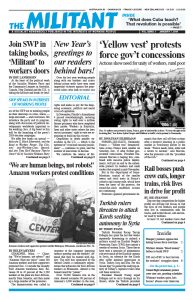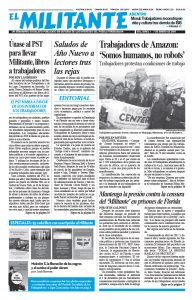Turkish President Recep Tayyip Erdogan has spent the last few weeks repeatedly threatening to unleash a military assault on Kurdish People’s Protection Units (YPG) that control a swathe of eastern Syria. These forces have won a measure of autonomous rule over much of the Kurdish cantons in Syria, an advance for the Kurds who suffer national oppression in Syria, Turkey, Iraq and Iran. For this reason they’ve gained the undying enmity of Turkey’s capitalist rulers who call them terrorists.
President Donald Trump urged Erdogan not to carry through on his threats, while the Turkish president insists Washington abandon its support for the YPG.
On Dec. 19 Trump announced the war against Islamic State had been won in Syria and he was beginning the withdrawal of U.S. troops there. Two days later Erdogan said Ankara would postpone any offensive against Kurdish forces in northern Syria for at least a month to give the U.S. time to withdraw.
Even with this drawdown, the U.S. rulers have the most formidable military force in the Middle East, deployed to protect their imperialist interests.
Though the complete figures are secret, the Pentagon admits to some 50,000 troops there, along with a powerful armada of fighter jets, bombers, artillery and missiles, and the Fifth Fleet.
Unwilling to deploy U.S. troops on the ground to defeat Islamic State, the U.S. rulers relied on the YPG to lead the effort to drive the reactionary sect out of Syria, backed by Washington’s air power. As a result, the YPG-led Syrian Democratic Forces (SDF) now controls 25 percent of the country east of the Euphrates River, both in Kurdish areas near the Turkish border and majority Arab areas that were former IS strongholds like Raqqa. Some of these areas are home to most of the oil in Syria.
Washington wants to continue pushing back against Tehran’s expanding military reach in the region. The rulers in Iran provided decisive forces, along with Moscow’s air power, to save the collapsing rule of Bashar al-Assad in Syria, following a popular uprising aimed at overturning his tyranny. Assad threatens he will bring the area east of the Euphrates back under Syrian government control.
To bolster Erdogan’s threats, the Turkish army has mobilized thousands of troops and tanks close to the country’s border with Syria. They have rallied 15,000 fighters from Syrian opposition groups that Ankara arms to take part in an assault.
Washington tried to take steps to allay Ankara’s fear of YPG interference in Turkey. It invited Turkish forces to join joint patrols in Manbij to assure no attacks on Turkey were being organized. Similarly, Washington established 12 “observation posts” along the border, saying it would guarantee that no incursions into Turkey took place. Ankara says this is aimed at keeping an eye on Turkish troops.
Despite the U.S. rulers’ inability to resolve the conflicts across the Mideast, they are determined to protect their interests in the region.
Struggle for Kurdish sovereignty
The U.S. rulers have betrayed the Kurdish national struggle over and over for decades, but find it necessary to provide Kurdish forces here and in Iraq with some assistance for now in order to advance Washington’s interests.
Earlier this year the U.S. government imposed sanctions on Turkey, accelerating the decline of the country’s currency, the lira. In addition to bearing the brunt of Ankara’s military intervention in Syria and its crackdown on political rights at home, working people in Turkey face food prices that have risen 20 percent this year.
As the capitalist rulers in Iraq, Iran, Syria and Turkey seek to advance their conflicting interests, they remain determined to prevent the 30 million Kurds living within their borders from exercising national rights. For decades they’ve quelled Kurdish demands for sovereignty, banned their language, restricted land ownership and waged murderous assaults on Kurds who resist, often with Washington’s complicity. But they have been unable to crush Kurdish national aspirations.
As the U.S.-dominated imperialist order in the Mideast has come apart in the wake of wars the U.S. rulers have been unable to win, Kurdish parties have taken advantage of the weakening of regimes in Iraq and Syria to carve out a degree of self-rule. But the rulers in the region remain determined to constrain these moves, as was demonstrated when the Iraqi government — with the backing of Tehran and Ankara — organized to use force to quash the vote for independence in the Kurdish region of Iraq in September 2017, without Washington lifting a finger.

